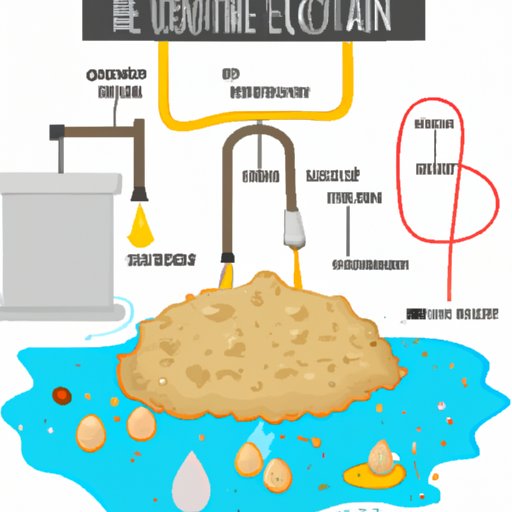Introduction
Have you ever walked into your house and noticed a strong, unpleasant smell that reminds you of rotten eggs? Such a smell can be quite disconcerting, and your immediate reaction is to find out where the smell is coming from. If you are experiencing a rotten egg smell in your home, you need not worry. In this comprehensive guide, we will help you identify the causes of the problem and how to fix it.
Causes of a Rotten Egg Smell in Your Home- A Comprehensive Guide
The rotten egg smell in your home can be caused by different things. However, the primary cause is the presence of hydrogen sulfide gas. This gas is produced by sulfur bacteria found in drains, sewage lines, and other decaying organic material. The gas has a pungent, rotten-egg odor that can be quite offensive.
Tracing the Source of a Rotten Egg Smell in Your Home
If you are experiencing a rotten egg smell in your home, tracing the source should be your top priority. The first step is to check for any clogs in your plumbing system. A clog in your plumbing system can cause sewer gases to back up into your house, resulting in the rotten egg smell.
The next step is to check the gas source. Natural gas has a smell added to it, which is similar to the rotten egg smell. If you suspect that the smell is coming from natural gas, leave the house immediately and call a professional.
7 Most Common Causes of a Rotten Egg Smell in Your Home
There are several causes of a rotten egg smell in your home. Here are the 7 most common causes:
- Drain and Sewage Lines
- Water Heater
- Well Water
- Water Softener
- Bathroom Fixtures
- Floor Drains
- Natural Gas
Each of these causes requires specific solutions to get rid of the odor. Let’s have a brief look at each:
Drain and Sewage Lines
Sewage lines and drains can get clogged, leading to a backup of sewage and stagnant water. This buildup of organic waste produces sulfur bacteria, leading to the rotten egg smell. To get rid of the odor, you need to unclog the drain and sewage lines to eliminate the source of the problem.
Water Heater
Your water heater could also be the source of the rotten egg smell. The anode rod in your water heater can react with the water, producing hydrogen sulfide gas. Replacing the anode rod with an aluminum or zinc-based one can help solve the problem.
Well Water
If your home uses well water, it could be the source of the rotten egg smell. The well water can contain high levels of sulfur, which is caused by the natural breakdown of decaying organic matter. Using a water filtration system can help get rid of the rotten egg smell.
Water Softener
A water softener can also cause the rotten egg smell. The resin beads inside the softener tank can break down and produce sulfur gas. Cleaning the tank and adding hydrogen peroxide to the resin bed can help solve the problem.
Bathroom Fixtures
The trap underneath your bathroom sink or shower can sometimes get dry, allowing gases from the drain to escape into your home. Running water through the drain can help prevent this problem.
Floor Drains
Floor drains can also get dry, allowing gases to come up from the sewage system. Pouring water down the drain can help solve the problem.
Natural Gas
Natural gas has a smell added to it, which is similar to the rotten egg smell. If you suspect that the smell is coming from natural gas, leave the house immediately and call a professional.

Why Does My House Smell Like Rotten Eggs and How to Fix It
Getting rid of the rotten egg smell in your home requires an understanding of what is causing the problem. Once you have identified the source of the smell, you can take the necessary steps to fix it. We have already discussed the different causes of the rotten egg smell in your home and how to fix them.
Fixing the problem may involve hiring a professional plumber or electrician. However, some solutions like pouring water down the dry floor drains can be done by yourself. Always ensure to follow the manufacturer’s instructions when using chemical solutions to get rid of the smell.
What You Need to Know About Rotten Egg Smell in Your House
A rotten egg smell in your home can be indicative of other serious problems. For instance, it can be a sign of a gas leak, which can have fatal consequences. Therefore, always take the problem seriously and don’t merely mask the smell with air fresheners.
Quick Tips for Getting Rid of a Rotten Egg Smell in Your Home
- Run the faucets and flush toilets regularly
- Pour water down the floor drains
- Clean out your drain and sewage lines regularly
- Replace the anode rod in your water heater
- Install a water filtration system
The Dangers of Ignoring a Rotten Egg Smell in Your Home and How to Deal with It
Ignoring a rotten egg smell in your home can have serious consequences. If, for instance, the smell is caused by a gas leak, it can lead to explosions or fire. Therefore, it is essential to deal with the problem immediately by identifying the source and fixing it.
If you suspect that the smell is caused by a gas leak, leave the house immediately and call a professional.
Conclusion
In conclusion, a rotten egg smell in your home can be quite unpleasant. However, identifying the source of the problem and taking the necessary steps to fix it can alleviate the problem. Always take the problem seriously and don’t merely mask the smell with air fresheners. Remember, quick action can help avoid potential health hazards and save lives.
Final thoughts and additional advice
Maintaining good hygiene practices in your home, such as regularly cleaning your drain and sewage lines, can help prevent the buildup of sulfur bacteria. Additionally, hiring a professional plumber to inspect your plumbing system can help identify and solve any potential problems before they get out of hand.
